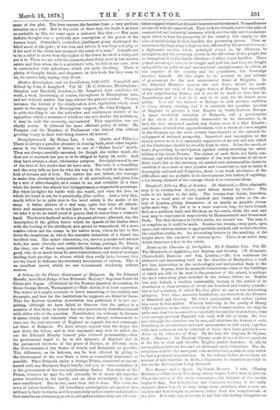to the government of the two neighbouring States. The object
of the Two Knaves and a Queen. By Frank Barrett. 3 vols. (Tinsley Prince, whoever he may be, will naturally be to make the supreme Brothers.)—This novel, like many others, begins intter than it goes on. power hereditary in his family, and an alien sovereignty is thus at When the action of the story commences, the interest of the reader Once established. But in fact, more than this is done. The seeds are begins to flag. The descriptions and character-drawing of the early sown of future troubles. All hereditary sovereignties are more or less chapters please him (if wo may judge from ourselves, after a very ex- Military in their instincts, and they naturally seek to create and attach to tonsive and dear-bought experience) better than the complications of theirfamilies an aristocracy,to whose aid andassistance they can with con- the plot. It is only fair, however, to say that this fooling disappears as 'Dent of the plot. The hero rescues the heroine from a very perilous fidenceappeal whentheirdynastie interestsare threatened. Thesealliances situation on a reef. But in the crisis of their fate, for death is at least are tarred with the same brush. They seek for friends, not for the sake of se probable as life, we Cane upon a sentence like this :—" Her most commercial and industrial interests, which are the only sure foundations definite thought was a perfectly new conception of the power of the upon which to base the prosperity of the country, but simply for the human hand. Ostrander's controlled, intelligent grasp challenged the sake of maintaining in their families the governing power. Then an blind mood of the gale ; it was iron and velvet, it was fury and pity, as unnecessarily large army is kept on foot, officered by the new aristocracy; if the soul of the storm had assumed the sense of a man." It ought not a diplomatic service, whose principal object is, by alliances, to to be a relief to move from the higher to the lower levels of a story, and strengthen, not the sovereign power in the affections of the people, but yet it is. When we are with the common-place Cory, first in her maiden to strengthen it in the family affections of other royal families. These estate and then when she is a minister's wife, we feel at our ease. Avis ptimal advantages have to be bought and paid for, and they aro bought is surrounded with splendours which are quite dazzling. There is and peid for by political and international entanglements, in which, at plenty of thought, fancy, and eloquence in this book, but they seem to the expense of the country and its population, the Sovereign
us, we cannot help saying, very ill set. involves himself. All this ought to be avoided in any scheme Modern Birmingham and its Instautions, 1841-1871. Compiled and of government for the new autonomical State of Bulgaria. In Edited by John A. Langford. Vol. II. (E. C. Osborne, Birmingham ; Sir Edmund Hereby's opinion the now State should be made Simpkin and Marshall, London.)—ale Langford here concludes his independent not only of the larger States of Europe, but especially o work, a work interesting, of course, throughout to Birmingham men, of the neighbouring States; and it should be made to love this in- and not without matter that may attract the general reader. We may dependence, and to look to it, and to it only, for its future pros- instance the history of the Adulteration Acts, legislation which owed purity. It is not the interest of Europe to add another ambition much to the energy of a Birmingham surgeon, Mr. John Postgate. It to those already existing, and it is certainly the peculiar interest is quite startling to see the collective and continuous records of the of England to prevent a Slav Empire in South-Eastern Europe. opposition which a measure of which no one now doubts the usefulness, A large territorial extension of Bulgaria, and a government it may be said the necessity, encountered. This opposition was not of the whole of it essentially democratic in its character, is, in chiefly active. It followed the more efficient policy of delay. Mr. fact, the hest safeguard against any dream even of a Slav Empire ; Postgate and the Members of Parliament who helped him without and dreams of territorial aggrandisement, with a vision of a now empire growing weary in their well-doing deserve all honour. in the distance, are the most certain impediments to the rational de- sketch before us is, it is eminently suggestive of an end and aim which at the Conference should be steadily kept in view. It has the merit, at least, of providing by anticipation against rudely troubling the Banal- bilities of the Great Powers. The claims of each State are fairly eon- they have always a clear, wholesome purpose. Straightforward is one sidered, and while there is no sacrifice of the real interests of the new of the best of her works that we have seen. The hero is a foundling, State itself, but on the contrary, an earnest and statesmanlike desire to and the story tells us how he wins his way in the world in the matters establish it on a basis at once popular and conservative, and to make it difficulties only too probable in its development, but rather, if anything,


































 Previous page
Previous page